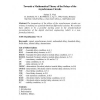4128 search results - page 43 / 826 » Learning and using relational theories |
ACL
2009
13 years 7 months ago
2009
Coreferencing entities across documents in a large corpus enables advanced document understanding tasks such as question answering. This paper presents a novel cross document core...
NIPS
2008
13 years 11 months ago
2008
Stochastic relational models (SRMs) [15] provide a rich family of choices for learning and predicting dyadic data between two sets of entities. The models generalize matrix factor...
KDD
2005
ACM
14 years 10 months ago
2005
ACM
We describe an application of relational knowledge discovery to a key regulatory mission of the National Association of Securities Dealers (NASD). NASD is the world's largest...
CORR
2004
Springer
13 years 9 months ago
2004
Springer
The inequations of the delays of the asynchronous circuits are written, by making use of pseudo-Boolean differential calculus. We consider these efforts to be a possible starting p...
SDM
2007
SIAM
13 years 11 months ago
2007
SIAM
We introduce a new approach for Clustering and Aggregating Relational Data (CARD). We assume that data is available in a relational form, where we only have information about the ...

